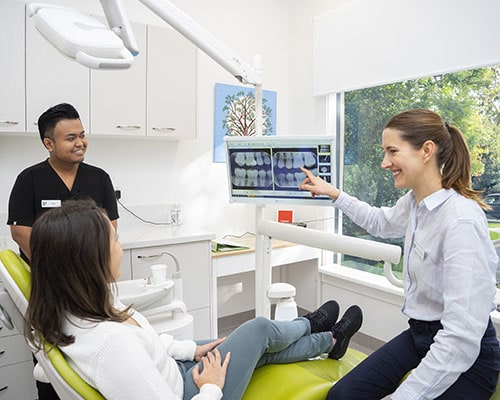Finding the right option for your child can be a helpful tool in encouraging them to brush and have good oral hygiene habits. You should begin brushing your child’s teeth for them as soon as the first teeth appear, and continue brushing your child’s teeth until they can do it properly themselves.
There are specific toothbrushes designed for kids whether they are manual or electric. Both of these toothbrushes are effective in removing all of the plaque and bacteria, and preventing your child from having tooth decay or gum disease.
Choosing the right toothbrush comes down to the individuality of your child – do they find electric toothbrushes more fun? Or is it easier for them to grip the toothbrush and brush themselves?
Do electric toothbrushes work better?
There is some evidence that electric toothbrushes are better at removing plaque and bacteria from your mouth than manual toothbrushes.
Electric toothbrushes are a good option for children (and adults) that struggle with the motion of brushing, even when they know how to do it properly. If you are one of these people we may recommend you try out an electric toothbrush and see if it’s easier and more effective.
If your child is happy using a manual toothbrush and it’s effective in their cleaning, it’s a good idea to stick with this as long as you are having successful results. Remember, it is important to change around your manual toothbrush head and to store it in a clean place.
What is easier for kids to use?
Children are still developing dexterity, and sometimes the small specific movements needed to clean your teeth manually are quite difficult for kids. This is a time when an electric toothbrush would be easier, as the oscillating action means that the kids simply have to position the brush in the right area, and leave it there for the right amount of time. Electric toothbrushes are also helpful for people who may press too hard with a manual toothbrush, as many of them have pressure sensors that automatically stop.
Both brushes are similar, in that for children they produce brushes with wider and shorter handles that are easy for kids to grip onto. Handle selection is unlikely to have any impact on the type of toothbrush you choose.
What do the kids think?
This is what toothbrush selection really comes down to. If a child likes their toothbrush and wants to brush their teeth with it then half of the battle is already over. You should be guided by your child and what they want. If the novelty of an electric toothbrush is good motivation then it is often a good option, and there are some inexpensive ones which still work very well.
If you have both, when you re-brush your child’s teeth after they are finished, assess how much plaque is remaining and use this as a guide to see what your child is most comfortable using properly. One size doesn’t fit all.
There are many children who think electric toothbrushes are cool and interesting, while they may even scare some kids at first. Some people may feel like they aren’t cleaning their teeth without the traditional brushing motion, while some may feel cleaner after using an electric toothbrush.
So, what should you choose?
We recommend that you let your kids take charge of their dental care and choose their own toothbrush. Make it a fun experience and show them all of the options to try and get them interested in dental care. There may be an overwhelming amount to choose from, but as long as you choose something suggested for their age range that is soft-bristled, you will be fine!
Manual toothbrushes may seem less exciting, but companies are producing almost everything in bright colours and Disney characters to appeal to a wide range of audiences. You can even find brushes where handles are shaped like popular kid’s television characters!
The most important thing is that when you find something that works for you and your child, stick with it. It’s very common to hear from parents how hard it is to motivate their children to brush. Also make sure that you and your child continue to attend regular dental checkups to make sure you’re doing a good job.



